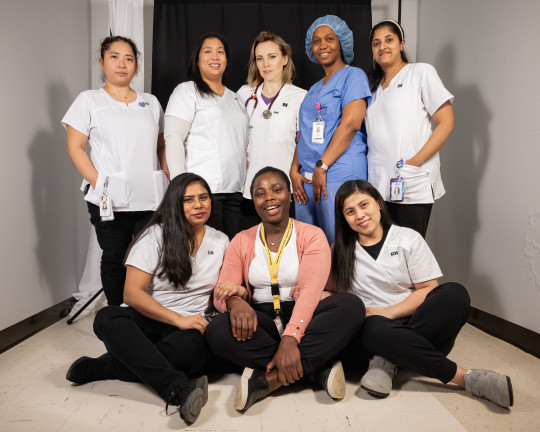Nova Scotia is leading the country with a new, first-of-its-kind initiative that expedites the application process for nurses from other countries to work in the province. Registered nurses from the Philippines, India, Nigeria, USA, UK, Australia, New Zealand or a different Canadian Province or Territory are eligible for registration and licensure in Nova Scotia immediately.
IWK Health has benefited from the initiative and hired internationally educated nurses (IENs) across the organization in areas including the Neonatal Intensive Care Unit, the pediatric operating room and the Prenatal Special Care Unit. To support these nurses, a new advance support lead for international educated nurses role has been created to guide them through the process and welcome them to the IWK.
In her role as advance support lead, Barbara Blays, works to ensure the successful integration of internationally educated nurses into the IWK. Blays is there to offer ongoing support beyond the initial transition, recognizing that adaptation to a new health care environment is a continuous process. She collaborates with clinical educators and other IENs support leads across the country to find ways to best support IENs while also strengthening the overall diversity and richness of the nursing workforce at IWK Health.
“I love being able to work with such an amazing group of nurses,” says Blays. “I have the lived experience of what it’s like to be an immigrant in a new country, adapting to a whole new culture, including the Canadian health care system. I admire the IENs’ resiliency and their diverse backgrounds; they are smart, professional and adventurous.”
Veronica Kotlev joined the IWK in 2022 from Israel as a registered nurse on the adult surgery and Perinatal Special Care Unit teams. She chose to work in Nova Scotia to join her sister and enjoy more work-life balance. Success of the IENs program for Kotlev looks like harmony between patients and providers.
“For me, success is measured by patient and staff satisfaction from what they are doing and getting at the end of the day. It’s all about being emphatic and accepting to your colleagues and patients as one, because even if I choose another country to practice my skills, it does not change who I am and my purpose to become a nurse from the beginning,” says Kotlev. “Let's love everyone for who they are, for their similar characteristics and for more for their diverse traits, which all make the world fascinating.”
Like Kotlev, Lois Obi moved to Nova Scotia in 2022. For Obi, she has enjoyed the friendliness of the province and being able to adapt into a family-oriented community. She works as a registered nurse in the pediatric operating room after previously working in the adult system at Dartmouth General Hospital. As a perioperative nurse, she sees the anxiety families feel their children are taken into the operating room.
“I like to reassure families and patients that they are in safe hands. I love that I’m part of the team solving problems that requires surgical intervention,” says Obi.
For Obi, successful implementation of this program means IWK will have achieved its objective of creating an equitable, diversified, and inclusive environment that is safe, welcoming and inclusive of all people.
“IENs bring a wealth of diverse experiences which enable IWK to provide better care to patients from various ethnicities and backgrounds in the Atlantic provinces. They also have multiple language skills that can assist patients not versed in English language and in turn promote patients' satisfaction and outcomes,” says Obi. “IENs are determined, resilient, and adaptable. Demonstrating these attributes in professional practice creates a positive work culture and enables all colleagues to learn from each other.”
In addition to excellent nursing skills generally, IENs are uniquely positioned to provide culturally competent care to patients. And ultimately, this can lead to better patient outcomes and experiences.
“IENs providing nursing care to patients from diverse ethnic backgrounds are more likely to promote culturally safe and innovative ideas,” says Blays. “Optimal health outcomes can be attained when patient cultural is well understood.”
